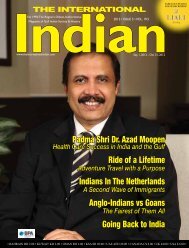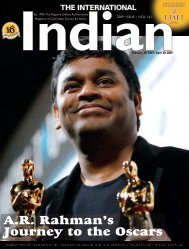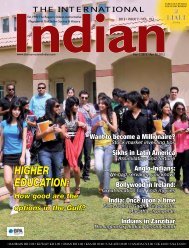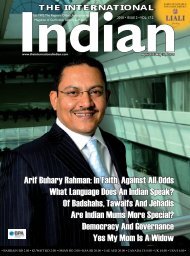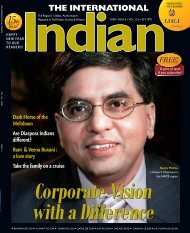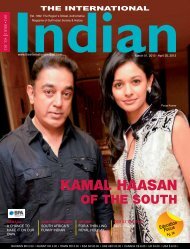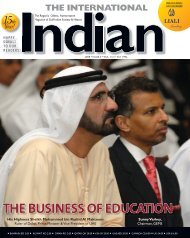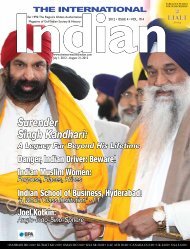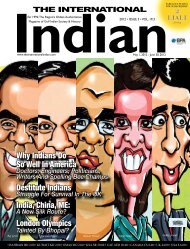Rensil D'Silva: How to Make it in Bollywood Education in the Gulf ...
Rensil D'Silva: How to Make it in Bollywood Education in the Gulf ...
Rensil D'Silva: How to Make it in Bollywood Education in the Gulf ...
Create successful ePaper yourself
Turn your PDF publications into a flip-book with our unique Google optimized e-Paper software.
HERITAGE<br />
th<br />
16<br />
ANNI V ERSARY<br />
ROMANCE OF THE EAST:<br />
MIRZA GHALIB AND<br />
THE GENIUS OF URDU<br />
The endur<strong>in</strong>g legacy of <strong>the</strong> Mughals <strong>in</strong> <strong>the</strong> Indian subcont<strong>in</strong>ent<br />
is <strong>the</strong> gift of <strong>the</strong> Urdu language. Urdu is truly a<br />
romance language of <strong>the</strong> East. And dur<strong>in</strong>g <strong>the</strong> time of <strong>the</strong><br />
Mughals, Urdu poetry reached <strong>it</strong>s zen<strong>it</strong>h w<strong>it</strong>h <strong>the</strong> mystical pen<br />
of Mirza Assadullah Khan Ghalib.<br />
by: Roy Joseph<br />
Heard melodies are sweet, but those unheard are sweeter;<br />
<strong>the</strong>refore, ye soft pipes, play on; not <strong>to</strong> <strong>the</strong> sensual ear<br />
but…<strong>to</strong> <strong>the</strong> spir<strong>it</strong> d<strong>it</strong>ties of no <strong>to</strong>nes. Hapless John Keats<br />
should not be faulted for cherish<strong>in</strong>g <strong>the</strong> lyricism of <strong>the</strong><br />
<strong>in</strong>effable over <strong>the</strong> poetry of <strong>the</strong> senses. But that young<br />
reprobate should have been chastised for not lett<strong>in</strong>g his imag<strong>in</strong>ation<br />
drift eastward. The Rubaiyat of Omar Khayyam, <strong>the</strong> poetry of Rumi,<br />
<strong>the</strong> whirl<strong>in</strong>g dervishes and <strong>the</strong> Sufi-<strong>in</strong>spired poetry of Persian-Mughal<br />
wr<strong>it</strong>ers such as Mirza Ghalib occupy an imag<strong>in</strong>ative space between <strong>the</strong><br />
eloquence of spoken word and <strong>the</strong> ravish<strong>in</strong>g silence of <strong>the</strong> sublime.<br />
Perhaps, Keats might have thought o<strong>the</strong>rwise had he listened <strong>to</strong> <strong>the</strong><br />
Ghalib is remembered for penn<strong>in</strong>g exquis<strong>it</strong>e<br />
verse <strong>in</strong> <strong>the</strong> classical ghazal form lend<strong>in</strong>g<br />
both meter and music <strong>to</strong> his verse.<br />
haunt<strong>in</strong>gly beautiful cadence of <strong>the</strong> classical ghazal.<br />
The heyday of <strong>the</strong> Mughal dynasty that preceded <strong>the</strong> Br<strong>it</strong>ish Raj<br />
is generally looked upon as a dark saga <strong>in</strong> Indian his<strong>to</strong>ry by Indians<br />
who look at culture purely<br />
through <strong>the</strong> monochromatic<br />
lens of nationalism. If we are<br />
honest w<strong>it</strong>h ourselves, we must<br />
acknowledge that <strong>the</strong> tragicomic<br />
script of human his<strong>to</strong>ry<br />
is for <strong>the</strong> most part a gory tale<br />
of blood-lett<strong>in</strong>g <strong>in</strong> which one<br />
form of tyranny is replaced by<br />
ano<strong>the</strong>r. Yet, <strong>the</strong>re is plenty of<br />
comic relief <strong>to</strong> be found <strong>in</strong> acts<br />
of compassion and also <strong>in</strong> <strong>the</strong><br />
creative artifacts of culture.<br />
Desp<strong>it</strong>e <strong>the</strong> ambivalence or<br />
hatred modern nationalists might<br />
have <strong>to</strong>wards <strong>the</strong> Mughals,<br />
Indian culture has at least been<br />
partially enriched by <strong>it</strong>. An<br />
analogy is <strong>in</strong> order.<br />
Picture a pious Protestant<br />
rag<strong>in</strong>g aga<strong>in</strong>st <strong>the</strong> genius of<br />
<strong>the</strong> brush that pa<strong>in</strong>ted <strong>the</strong> vault<br />
of <strong>the</strong> Sist<strong>in</strong>e Chapel largely<br />
because <strong>in</strong>dulgences were used <strong>to</strong><br />
beautify <strong>the</strong> ornate Basilica. The<br />
man who miffs at Michelangelo<br />
for this reason is fall<strong>in</strong>g prey <strong>to</strong><br />
<strong>the</strong> unfortunate tendencies of<br />
philist<strong>in</strong>ism. Pol<strong>it</strong>ics aside, great<br />
art is great art.<br />
The endur<strong>in</strong>g legacy of <strong>the</strong><br />
Mughals <strong>in</strong> <strong>the</strong> Indian subcont<strong>in</strong>ent<br />
is <strong>the</strong> gift of <strong>the</strong> Urdu<br />
language. Urdu is truly a romance<br />
language of <strong>the</strong> East. Urdu<br />
poetry reached <strong>it</strong>s zen<strong>it</strong>h w<strong>it</strong>h <strong>the</strong><br />
mystical pen of Mirza Assadullah<br />
Khan Ghalib, even though <strong>the</strong><br />
author was well-versed <strong>in</strong> Persian<br />
as well.<br />
Just as <strong>the</strong> Mughal dynasty<br />
was be<strong>in</strong>g eclipsed <strong>in</strong><strong>to</strong> oblivion<br />
by <strong>the</strong> superior, technological<br />
prowess of <strong>the</strong> English, a poetic<br />
jewel was born almost as a<br />
testament <strong>to</strong> <strong>the</strong> abid<strong>in</strong>g power<br />
of reflection aga<strong>in</strong>st <strong>the</strong> m<strong>in</strong>dless<br />
onslaught of both materialism<br />
and mach<strong>in</strong>ery. If <strong>the</strong> pen is<br />
<strong>in</strong>deed mightier than <strong>the</strong> sword,<br />
<strong>the</strong> e<strong>the</strong>real glow from <strong>the</strong> poetic<br />
canons of Mirza Ghalib is far<br />
more effulgent than <strong>the</strong> firepower<br />
of destructive cannons.<br />
Ghalib is remembered for<br />
penn<strong>in</strong>g exquis<strong>it</strong>e verse <strong>in</strong> <strong>the</strong><br />
classical ghazal form lend<strong>in</strong>g<br />
both meter and music <strong>to</strong> his<br />
verse. His verse sublimates<br />
<strong>the</strong> pa<strong>in</strong> and suffer<strong>in</strong>g of his<br />
turbulent period by turn<strong>in</strong>g<br />
heart-rend<strong>in</strong>g lamentations<br />
<strong>in</strong><strong>to</strong> ach<strong>in</strong>gly beautiful verse.<br />
Such a sentiment could easily<br />
turn <strong>in</strong><strong>to</strong> trivial nostalgia at <strong>the</strong><br />
hands of <strong>in</strong>ferior poets. The<br />
idealization of love <strong>in</strong> Ghalib’s<br />
verse is not unlike Dante’s idealization of love through <strong>the</strong> poetic<br />
persona of Beatrice <strong>in</strong> <strong>the</strong> latter’s Div<strong>in</strong>e Comedy. Idealization, <strong>in</strong><br />
this case, should not be mistaken for a mean<strong>in</strong>gless abstraction but<br />
as a deliberate strategy <strong>to</strong> render <strong>the</strong> chasm between true love and <strong>it</strong>s<br />
imperfect manifestation <strong>in</strong> human form pa<strong>in</strong>fully obvious.<br />
The endur<strong>in</strong>g legacy of <strong>the</strong> Mughals <strong>in</strong> <strong>the</strong> Indian<br />
sub-cont<strong>in</strong>ent is <strong>the</strong> gift of <strong>the</strong> Urdu language.<br />
Urdu is truly a romance language of <strong>the</strong> East.<br />
One could contend that <strong>the</strong> <strong>in</strong>fluence of Sufi mysticism <strong>in</strong> Ghalib’s<br />
lyricism emboldened him <strong>to</strong> simultaneously make bold statements<br />
of fa<strong>it</strong>h and embrace <strong>the</strong> mysteries of life as well. Paradoxically, <strong>the</strong><br />
sensual<strong>it</strong>y <strong>in</strong> his verse po<strong>in</strong>ts <strong>to</strong> a realm beyond <strong>the</strong> senses. While<br />
<strong>the</strong> <strong>the</strong>ological content of Christian<strong>it</strong>y is widely divergent from Sufi<br />
Mysticism, <strong>the</strong> sacrament of <strong>the</strong> Eucharist is <strong>the</strong> closest analog <strong>in</strong> that<br />
<strong>it</strong> is both corporeal and a foreshadow<strong>in</strong>g of <strong>the</strong> eternal. Similarly,<br />
Ghalib rejects <strong>the</strong> monastic impulse and embraces <strong>the</strong> beauty of both<br />
<strong>the</strong> sensual and <strong>the</strong> eternal.<br />
Consider one of his oft-quoted l<strong>in</strong>es:<br />
Let <strong>the</strong> ascetics s<strong>in</strong>g of <strong>the</strong> garden of Paradise—<br />
We who dwell <strong>in</strong> true ecstasy can forget<br />
<strong>the</strong>ir vase-tamed bouquet<br />
In our hall of mirrors, <strong>the</strong> map of <strong>the</strong> one Face<br />
Appears<br />
As <strong>the</strong> sun’s splendor would spangle a world<br />
made of dew<br />
When <strong>it</strong> comes <strong>to</strong> poetry <strong>in</strong> particular, cr<strong>it</strong>ics warn us that we should<br />
be wary of overly-confident <strong>in</strong>terpretations. Yet, one could ga<strong>the</strong>r at<br />
least <strong>the</strong> follow<strong>in</strong>g – Ghalib celebrates echoes of <strong>the</strong> eternal <strong>in</strong> <strong>the</strong><br />
‘here-and-now.’ Thus <strong>the</strong> ‘o<strong>the</strong>r-worldly’ monasticism that might<br />
usually lead <strong>the</strong> religious <strong>to</strong> reject this world gives way <strong>to</strong> a lifeaffirm<strong>in</strong>g<br />
pr<strong>in</strong>ciple that sees <strong>the</strong> goodness <strong>in</strong> creation as a reflection of<br />
<strong>the</strong> Eternal.<br />
If <strong>the</strong> c<strong>it</strong>y of Agra boasts of an arch<strong>it</strong>ectural monument of as<strong>to</strong>nish<strong>in</strong>g<br />
beauty, <strong>it</strong> should also boast of a poetic monument of similar symmetry.<br />
It <strong>in</strong>deed gave birth <strong>to</strong> Mirza Ghalib.<br />
Roy Joseph was born <strong>in</strong> Pondicherry and now resides <strong>in</strong> Chicago.<br />
He is currently work<strong>in</strong>g on a l<strong>it</strong>erary play.<br />
78<br />
The International Indian<br />
The International Indian 79



